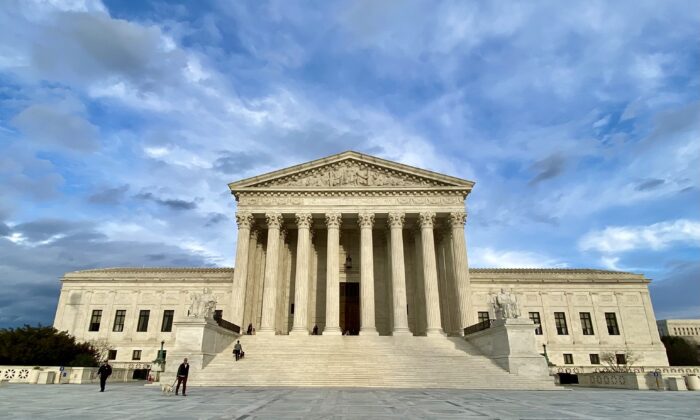The U.S. Supreme Court on Jan. 9 turned down a case that sought to overturn the results of the 2020 election.
Justices decided against hearing arguments in Raland Brunson v. Alma Adams. They didn’t explain their reasoning.
The move came after the case was distributed for justices to consider during their Jan. 6 conference.
Brunson, a Utah man, had asked the court to review the case after an appeals court in October 2022 upheld a lower court order dismissing his case.
Brunson originally filed his case in state court. He argued that federal officials, including all members of Congress, failed to meet their oath of office because they “intentionally refused” to investigate evidence that the 2020 election was fraudulent. The case was later moved to federal court.
Brunson didn’t pick up the phone or return a voicemail seeking comment on the Supreme Court’s rejection. He said in a brief statement on social media that “we will now make our next move,” or a petition for reconsideration.
The U.S. government didn’t respond to a request for comment. Solicitor General Elizabeth Prelogar had opted to file no response to Brunson’s petition with the nation’s top court.
Brunson’s Case
Brunson noted that President Joe Biden’s campaign rallies drew fewer people than former President Donald Trump’s, and said that was “circumstantial evidence” that warranted an investigation into election fraud, but that defendants refused to investigate. He also pointed to how election laws in multiple states were changed before the election, including some changes that were later found to be unconstitutional, and affidavits from poll workers and others attesting to fraud.
The intentional act not to investigate fraud was an act of war and an attack against Brunson’s right to participate “in a honest and fair election,” according to the complaint. It also violated the U.S. Constitution, Brunson said.
He asked the court to remove the defendants from office and to order Trump to be inaugurated as president.
Government lawyers urged the court to dismiss the case, saying the claims were barred by legislative immunity.
1st Judgment
The court that received the case, the U.S. District Court for the District of Utah, said Brunson failed to establish standing.
U.S. Magistrate Judge Jared Bennett, appointed by other judges, said in a recommendation that Brunson didn’t prove he has a “personal stake” in the outcome of the action, or that he suffered an injury caused by the defendants.
“Mr. Brunson has failed to establish standing under Article III of the United States Constitution because all of his causes of action plead generalized claims of legislative nonfeasance arising out of the counting of electors’ votes,” Bennett said. “Mr. Brunson’s purported injury is precisely the type of undifferentiated and generalized grievance about the conduct of government that courts have declined to consider based on standing.”
Brunson objected to the recommendation and asked to file an amended complaint but District Judge Jill Parrish, an Obama appointee, rejected the request and adopted the recommendation, dismissing the case.
“Brunson does not argue that the changes to his complaint would affect his lack of standing to bring his claims. And the court is unable to discern any way in which the proposed changes would affect his standing to sue members of Congress,” Parrish said.
2nd Decision
The U.S. Court of Appeals for the 10th Circuit later upheld the decision.
Brunson didn’t provide evidence he has standing, U.S. District Judge Bobby Baldock, a Reagan appointee, wrote in the ruling.
“Essentially, he contends that because he alleged the defendants acted fraudulently, and because ‘fraud vitiates whatever it touches,’ he has an ‘unfettered right to sue the Defendants,’ and any federal law or case law is inapplicable if it ‘support[s] treason, acts of war or the violation of Brunson’s inherent unalienable (God-given) rights,'” Baldock said. “But none of his supporting authorities suggests that allegations of fraud, acts of war, or the violation of allegedly ‘inherent unalienable (God-given) rights,’ relieve a plaintiff from demonstrating Article III standing.”
The U.S. Constitution’s Article III sets requirements for standing, restricting courts to deciding certain cases.
Brunson also offered an insufficient argument against the lower court’s order finding that the government is protected by sovereign immunity, the appeals court ruled.
Brunson told the Supreme Court that he has standing and that his arguments weren’t properly addressed in the lower court rulings.
“Brunson has an unfettered right to sue the Respondents under the serious nature of his claim,” the petition states, adding that “Brunson’s allegations against Respondents’ adhering to a domestic enemy, and committing acts of fraud are not protected by any kind of legislation of jurisdictional immunity.”
“Essentially, acts of Congress cannot protect fraud, nor protect the violation of the Oath or that give aid and comfort to enemies of the United States Constitution or America as alleged in Brunson’s complaint against the Respondents. These are facts that cannot be overcome,” the document states.
https://www.theepochtimes.com/mkt_app/supreme-court-rejects-case-seeking-to-overturn-2020-election_4971550.html?src_src=News&src_cmp=breaking-2023-01-09-3&est=PoLa%2FCAeFsycddr5A3vD8b9D6BQp%2FD5ib1Rzf5sNkoDEMtYNtJdJKtZWJ58N9oHXaf8fPDa6


No comments:
Post a Comment